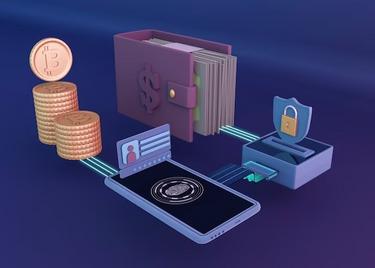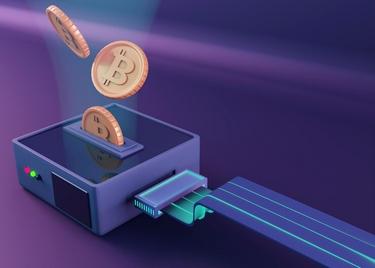The most common non-custodial crypto wallets
Non-custodial crypto wallets empower users with full control over their cryptographic keys and, consequently, their digital assets. This autonomy ensures heightened security and privacy, as the assets are not stored with a third-party service. The landscape of non-custodial wallets is diverse, with options ranging from mobile and desktop applications to hardware and paper wallets. This document outlines some of the most popular non-custodial wallets, highlighting their unique features and the security benefits they offer.
Popular Non-custodial Wallets
1. MetaMask: A widely used non-custodial wallet[1], MetaMask functions as a bridge to the decentralized web, allowing users to interact with Ethereum[2]-based dApps directly from their browser. It supports a wide range of ERC-20[3] tokens and NFTs, offering both convenience and versatility.
2. Ledger[4]: Known for its robust security features, Ledger is a hardware wallet[5] that stores users’ private keys[6] in a secure hardware device, making it immune to computer viruses and online phishing[7] attacks. Ledger supports a vast array of cryptocurrencies[8], making it a preferred choice for users holding multiple types of assets.
3. Trust Wallet: A mobile wallet designed for simplicity and security, Trust Wallet supports a wide range of cryptocurrencies and enables users to store private keys on their device securely. It also provides access to decentralized exchanges and Web3 browsers, facilitating engagement with the decentralized ecosystem.
Key Facts
- MetaMask is popular for its ease of use and direct interaction with Ethereum-based dApps.
- Ledger wallets are celebrated for their physical security and support for multiple cryptocurrencies.
- Trust Wallet offers a user-friendly mobile experience with access to a wide range of digital assets.
- Non-custodial wallets require users to manage their private keys responsibly.
The most common non-custodial crypto wallets
Non-custodial crypto wallets have become a cornerstone of the cryptocurrency[9] ecosystem, offering users full control over their digital assets. Unlike custodial wallets, where a third party[10] holds the private keys, non-custodial wallets give the user sole ownership of their private keys and, consequently, their funds. This autonomy ensures that users are not reliant on financial institutions for security or access to their cryptocurrency. In this exploration, we’ll delve into some of the most common and highly regarded non-custodial crypto wallets, highlighting their unique features and the benefits they offer to users in the ever-evolving digital asset landscape.
Metamask
Metamask is perhaps the most recognized non-custodial wallet, primarily due to its user-friendly interface[11] and integration with web browsers through extensions. It supports Ethereum and other ERC-20 tokens, making it a go-to choice for users interacting with decentralized applications (dApps) and smart contracts[12]. Metamask’s ease of use, coupled with its secure private key[13] storage solution, has positioned it as a favorite among both novice and experienced cryptocurrency users.
Trust Wallet
Trust Wallet, acquired by Binance in 2018, is a versatile non-custodial wallet that supports a wide range of cryptocurrencies, including Ethereum, Bitcoin[14], and many ERC-20 and ERC-721 tokens. It offers an intuitive interface for mobile users, along with features like a built-in Web3 browser, which facilitates seamless interaction with decentralized applications directly from the app. Trust Wallet’s commitment to privacy and security, without sacrificing convenience, makes it a popular choice.
Ledger Nano S/X
Ledger Nano S and X are hardware wallets that provide an extra layer of security by storing users’ private keys on a physical device. These wallets support a vast array of cryptocurrencies and are designed for those who prioritize security above all else. The Ledger Nano X offers Bluetooth connectivity, allowing for easier management of assets on the go, while the Nano S is recognized for its affordability and robust security features.
Trezor
Trezor is another prominent player in the hardware wallet space, known for its pioneering role in offering offline storage solutions for digital assets. It supports a broad spectrum of cryptocurrencies and features a straightforward interface for managing assets. Trezor wallets are distinguished by their emphasis on security, offering features like passphrase entry and a secure PIN system to protect against unauthorized access.
Electrum
Electrum is one of the oldest and most trusted Bitcoin wallets available today. It is celebrated for its speed and simplicity, focusing exclusively on Bitcoin to provide a streamlined experience. Electrum offers advanced features like customizable transaction fees, hardware wallet integration, and multisignature support, catering to the needs of both beginners and advanced users.
Atomic Wallet
Atomic Wallet stands out for its support of over 300 cryptocurrencies and its built-in atomic swap feature, which allows for direct, peer-to-peer exchanges between different cryptocurrencies without the need for an intermediary. It also offers purchase and staking functionalities, making it a comprehensive solution for users looking to manage and grow their cryptocurrency portfolio.
Exodus
Exodus is a desktop and mobile wallet known for its attractive user interface and ease of use. It supports a wide range of cryptocurrencies and integrates with the Trezor hardware wallet, offering a balance between convenience and security. Exodus also features a built-in exchange[15], allowing users to trade cryptocurrencies directly within the wallet.
In conclusion, non-custodial crypto wallets play a vital role in empowering users with control over their digital assets. Whether you prioritize security, versatility, or user experience, there is a non-custodial wallet out there that meets your needs. As the cryptocurrency landscape continues to evolve, these wallets will remain essential tools for managing and securing digital assets in a decentralized world.
- Wallet — A digital tool that allows users to store and manage their cryptocurrency addresses.
- Ethereum — A blockchain platform with its own cryptocurrency, Ether, is known for smart contract functionality.
- ERC-20 — A technical standard used for smart contracts on the Ethereum blockchain for implementing tokens.
- Ledger — A digital record of all cryptocurrency transactions, maintained across several computers in a distributed manner.
- Hardware Wallet — A physical device that stores the user's private keys securely offline.
- Private Keys — Cryptographic keys that are used to access cryptocurrency addresses and sign transactions.
- Phishing — A cybercrime in which a target or targets are contacted by email, telephone or text message by someone posing as a legitimate institution to lure individuals into providing sensitive data.
- Cryptocurrencies — Digital or virtual currencies that use cryptography for security and operate on a decentralized system, unlike traditional currencies.
- Cryptocurrency — Digital or virtual currency secured by cryptography, facilitates secure, anonymous transactions.
- Third Party — An entity that operates the custodial wallet, holding the cryptographic keys on behalf of the user.
- User-Friendly Interface — A design approach that makes the user's interaction as simple and efficient as possible.
- Smart Contracts — Self-executing contracts with terms directly written into code, facilitating, verifying, or enforcing a contract on the blockchain.
- Private Key — A secure digital code known only to the owner that allows them to access their cryptocurrency.
- Bitcoin — The first and most well-known cryptocurrency, was introduced in 2009 by Satoshi Nakamoto, who developed Bitcoin.
- Exchange — A platform where individuals can buy, sell, or trade cryptocurrencies for other digital currency or traditional currency.
- MetaMask. 'A crypto wallet & gateway to blockchain apps'.
- Ledger. 'Ledger - Hardware Wallet - State-of-the-art security for crypto assets'.
- Trust Wallet. 'Trust Wallet - Best Cryptocurrency Wallet'.



